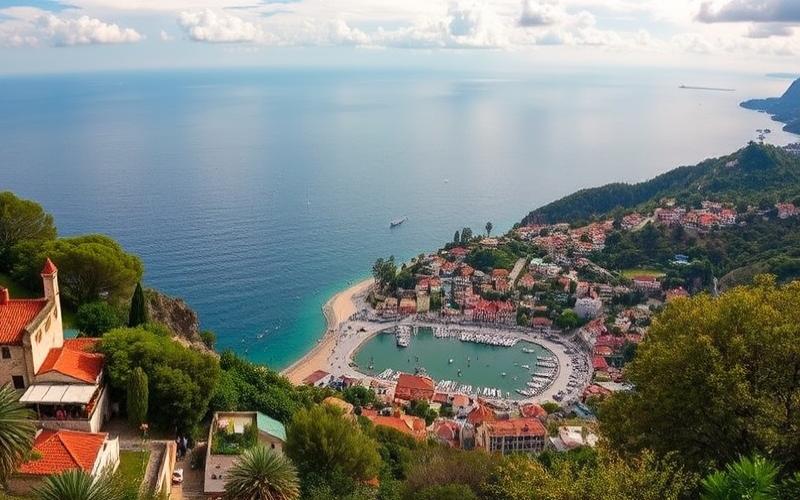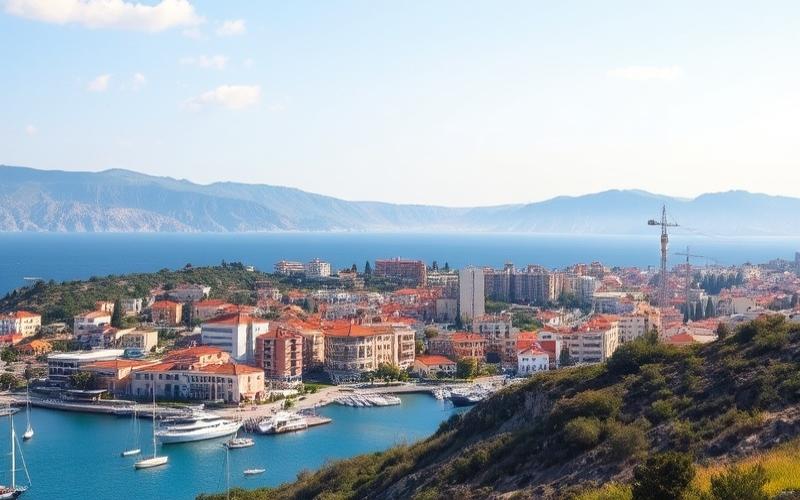
 Published on and written by Cyril Jarnias
Published on and written by Cyril Jarnias
The island of Cyprus, often considered a Mediterranean paradise, is currently experiencing profound shifts in its real estate market due to unexpected geopolitical factors. The war in Ukraine, though geographically distant, has triggered a series of economic and societal impacts that are being felt even in this bastion of stability in Southern Europe.
As investors and potential buyers readjust their strategies, real estate prices appear to be following an uncertain trajectory, exacerbated by growing demand from European nationals seeking a secure refuge.
This article explores how this international context is disrupting the Cypriot market and what opportunities are emerging in this unprecedented situation.
Geopolitical Consequences of the Ukraine War on the Cypriot Real Estate Market
The geopolitical instability caused by the war in Ukraine has profoundly altered capital flows to Cyprus, reinforcing its status as a safe haven for real estate investments in a region marked by uncertainty. This perception of relative stability has attracted investors looking to diversify and secure their assets, particularly amid the turbulence affecting Eastern Europe.
Cyprus’s Appeal as a Safe Haven in Times of Crisis
- Strategic position within the EU and favorable legal framework.
- Enhanced reputation as a haven for foreign capital during regional instability.
- Resilience of the Cypriot real estate market despite neighboring conflicts: steady growth and maintained investment volumes.
| Indicator | Value/Trend |
| Projected Market Volume (2024) | 116.3 billion USD |
| Residential Volume (2024) | 89.58 billion USD |
| Expected Annual Growth (2024–28) | 4.05% |
Flows and Profiles of Ukrainian and Russian Investors
The war has disrupted real estate demand from Ukraine and especially Russia. Traditionally very active in the Cypriot market, these buyers have seen their access restricted by various international sanctions targeting certain Russian nationals. However:
- Direct purchases by Russians have decreased due to banking restrictions/sanctions.
- Some flows have been redirected through offshore structures or intermediaries not subject to sanctions.
- Wealthy Ukrainians have sought to relocate their assets away from the conflict zone, helping sustain high-end demand.
Cyprus’s Policies on Foreign Investment
Cyprus had implemented an attractive program known as “citizenship by investment,” which allowed for quick passport acquisition in exchange for a certain level of real estate or financial investment. In response to increased European pressure since the conflict began:
- This program was officially suspended by the end of 2020 and then adapted to strengthen control over the origin of foreign funds.
- Stricter KYC/AML procedures now apply to limit any reputational risk associated with funds originating from or transiting through Russia or sanctioned areas.
Potential Long-Term Implications for the Cypriot Market
Despite these regulatory adjustments and a temporary dip due to the partial withdrawal of traditional Russian buyers, several structural trends support future stability:
- Renewed confidence among international investors thanks to
- Demonstrated resilience in the face of recent external shocks
- Rapid adaptation of the local real estate sector
- Gradual diversification of investor profiles
- Relative increase in investors from Israel, Western Europe, and even Asia
- Sustained anticipated growth
- Optimistic projections for overall investment volume in the residential segment
In summary:
The regional geopolitical context continues to significantly influence the profile and motivations of foreign buyers—but Cyprus capitalizes on its institutional stability to solidify its position among the preferred destinations for Mediterranean real estate investment.
Good to Know:
The war in Ukraine has significantly redirected capital flows to Cyprus, which has become an attractive safe haven for real estate investments during periods of geopolitical uncertainty. Ukrainian and Russian investors, seeking to secure their assets, have increased their presence in the Cypriot market, although a notable decline in demand from Russians has been observed following European economic sanctions targeting Russia. In 2022, transactions involving Ukrainian buyers doubled compared to the previous year, illustrating a favorable dynamic for certain market niches. Cypriot policies, such as the citizenship by investment program, have also been reexamined to align the country’s attractiveness strategy with the changing international context. In the long term, this evolution is likely to strengthen investor confidence while posing challenges related to potential market overheating and the need to maintain real estate stability in this geostrategic region.
Impact of Ukrainian Refugee Arrivals on Housing in Cyprus
Since the beginning of the war in Ukraine, Cyprus has welcomed approximately 24,410 Ukrainian refugees, according to the most recent statistics collected up to March 2025. This figure represents a significant share for a country with a total population of about 900,000 inhabitants.
Estimated Distribution of Ukrainian Refugees by Region in Cyprus:
| Region | Estimated Number of Refugees |
|---|---|
| Nicosia | ~8,500 |
| Limassol | ~7,200 |
| Larnaca | ~4,000 |
| Paphos | ~3,000 |
| Others | ~1,700 |
The sudden arrival of thousands of people has led to a sharp increase in rental demand in major Cypriot cities. Local property owners and real estate agents report increased pressure on the housing market, particularly in central and tourist areas where supply was already limited before the conflict.
Observed Consequences on Cypriot Real Estate:
- Rapid rise in rents in large cities, sometimes exceeding 15% in certain segments between early 2022 and mid-2024.
- Notable decrease in available rental housing stock, particularly affecting Limassol and Nicosia.
- Additional pressure on affordable housing; some local households faced greater difficulties accessing housing.
- Development of a temporary or seasonal rental segment to absorb this influx.
Local Perspectives:
A real estate agent based in Limassol reports that “by summer 2022, it became very difficult for any newcomer—whether local or foreign—to rent a family apartment without accepting a substantial price increase.”
Government Initiatives Implemented:
- Provision of state-subsidized temporary housing for vulnerable families.
- Administrative simplification to facilitate access to the private rental market for temporary status holders.
- Collaboration with local NGOs to ensure rapid integration (language courses, social support).
- Occasional incentives offered to owners making their vacant properties available to refugees (partial tax exemptions).
Data from local studies indicate that this real estate pressure has had a domino effect on several related economic sectors: residential construction (moderate revival), social services, and a general increase in the cost of urban living.
Expected Economic Implications:
Short Term
- Continued inflation of urban rents
- Possible slowdown in local purchasing power
- Increased opportunity for real estate investors
Long Term
- Structural need to expand the affordable rental housing stock
- Gradual adaptation of public policies to new migration flows
- Potential lasting sociocultural diversification in certain urban communities
The Cypriot experience thus illustrates how a sudden migration shock can profoundly transform the internal balance of an island real estate market while forcing authorities and private actors to innovate in response to new social needs.
Good to Know:
Since the beginning of the war in Ukraine in 2022, Cyprus has welcomed approximately 15,000 Ukrainian refugees, primarily concentrated in the Nicosia, Limassol, and Larnaca regions. This massive arrival has caused a significant increase in housing demand, leading to a 15% rise in real estate prices in some areas, according to local data. Real estate agents report a shortage of short-term rentals, exacerbated by an already tight market, often forcing newcomers to seek temporary solutions. The Cypriot government has responded by implementing housing assistance programs and financial aid to facilitate refugees’ access to real estate. A study by the Cyprus Center for Economic Studies suggests that this influx could revitalize less populated regions in the long term, but in the short term, it complicates the situation for local residents struggling to find affordable housing.
Real Estate Investment Strategies in Cyprus Amid Geopolitical Tensions
The impact of geopolitical tensions, particularly the war in Ukraine, on the Cypriot real estate market is mainly reflected in an increased perception of Cyprus as a haven of stability in a region marked by uncertainty. Despite the global repercussions of the Ukrainian conflict, the Cypriot real estate market has demonstrated strong resilience. Initial concerns related to the war and its consequences were quickly mitigated, notably due to renewed confidence from foreign investors, especially Israelis. The sector continues to show robust growth with a projected volume of 116.3 billion dollars for 2024 and an anticipated annual rate of 4.05% between 2024 and 2028.
Current Opportunities for Investors:
- Strategic positioning of Cyprus as a stable destination for international capital.
- Sustained growth in the residential segment with an estimated volume of nearly 90 billion USD.
- Growing demand linked to the repositioning of economic actors seeking markets less exposed to direct risks from regional conflicts.
Specific Risks:
- Historical dependence on Russian and Ukrainian markets, which exposes certain segments (tourism and real estate investments) to external shocks.
- Potential temporary slowdown during major geopolitical events or the sudden introduction of new international sanctions.
| Opportunities | Risks |
|---|---|
| Relative stability | Tourism/Russian dependence |
| Residential growth | Sensitivity to sanctions |
| Influx of investors | Fluctuation in local buyer morale |
International sanctions imposed following the Russo-Ukrainian conflict have had several repercussions on the Cypriot economy:
- Notable decrease in Russian financial flow to local real estate.
- Need for Cyprus to diversify its foreign clientele (now focusing on the UK or Israel).
- Gradual adaptation of the banking and real estate sectors to financial restrictions targeting certain buyer profiles.
To minimize these risks in this uncertain context, several strategies are essential:
- Geographic diversification: spread investments across different Cypriot cities (Limassol remains dynamic, but Nicosia or Larnaca also present opportunities).
- Prioritize long-term assets such as high-end residential real estate or rental properties targeting the European middle class.
- Turn to promising sectors like high-end seasonal rentals or commercial real estate linked to medical/technological tourism.
- Regularly analyze regulatory developments to avoid any unexpected negative effects from new international restrictive measures.
Concrete Examples:
- Several developers are now focusing on sustainable development (eco-efficient housing) to attract European clients sensitive to ESG criteria.
- Hotel groups are diversifying their offerings toward medical and sports tourism to reduce their exclusive exposure to traditional beach tourism.
Key Recommendations for Entering the Cypriot Market Currently:
- Conduct regular monitoring of regulatory developments related to international sanctions;
- Favor acquisition in attractive urban areas offering high liquidity;
- Prioritize new residential real estate meeting European environmental standards;
- Partner with recognized local partners for better operational management in case of a new geopolitical crisis;
- Avoid any sector overexposure—prefer a balanced portfolio between primary/secondary residences, long-term rental properties, and possibly commercial assets adapted to the new post-crisis tourist profile;
Cyprus thus remains attractive despite regional tensions thanks to its proven ability to quickly absorb external shocks while adapting its real estate offerings to meet new global expectations.
Good to Know:
Cypriot real estate is feeling the effects of the war in Ukraine, which has led to increased uncertainty and heightened market volatility. Despite this, investors can find opportunities, particularly by focusing on resilient sectors like the recovering tourism industry, or by betting on long-term assets to offset risks. Sanctions against Russia have affected the economy, diminishing the participation of some Russian investors, but this also opens the market to other players looking to diversify their portfolios. Local and foreign investors should consider diversifying their assets to minimize the impact of geopolitical tensions and prioritize projects aligned with sustainability goals to meet new market demands. It is advisable to collaborate with local experts to navigate this complex climate and take advantage of Cypriot economic policies favorable to foreign investments.
Disclaimer: The information provided on this website is for informational purposes only and does not constitute financial, legal, or professional advice. We encourage you to consult qualified experts before making any investment, real estate, or expatriation decisions. Although we strive to maintain up-to-date and accurate information, we do not guarantee the completeness, accuracy, or timeliness of the proposed content. As investment and expatriation involve risks, we disclaim any liability for potential losses or damages arising from the use of this site. Your use of this site confirms your acceptance of these terms and your understanding of the associated risks.

















































